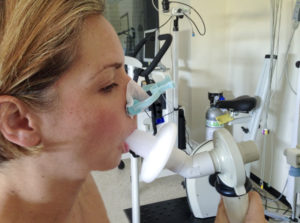
If you are still undiagnosed but visit your doctor with a number of symptoms, s/he is likely to order additional testing specific to those symptoms, even as she is ordering testing to try to determine what is going on. For example, if you come in complaining of shortness of breath, in addition to ANA and other specific testing, she is likely to order a number of tests, including a pulmonary function test (PFT), as well as possibly a Doppler echocardiogram and a CT scan. If you have difficulty swallowing or severe heartburn, s/he may order an upper GI endoscopy and esophageal manometry. These tests are discussed more fully in the Scleroderma FAQ. However, if your initial symptoms are less immediately concerning, for example, only swollen fingers in the mornings, Raynaud’s, and occasional heartburn, then the immediate focus is likely to be restricted to diagnostic testing (and perhaps order for medications that might help the Raynaud’s symptoms and heartburn). However, if the diagnostic test ultimately indicates that you either have or are likely to develop one of the forms of scleroderma, then your physician should order a number of baseline tests to try to determine if you are developing problems that are not yet causing clinical symptoms but are likely to in the future. This will allow you to start treatments earlier than would be the case if you wait until more obvious clinical symptoms start to occur. Since scleroderma progresses at a very variable rate, you may never develop certain symptoms, but it is very prudent to be checking for these symptoms on a regular basis in order to detect them as early as possible.
Here are some baseline tests and assessments that should be ordered when you are diagnosed with either active or potential scleroderma, even if you have no specific symptoms (see the full Scleroderma FAQ for more details). Some of these tests need to be repeated on a regular basis, even if you continue to show no clinical symptoms. Note that if specific acute clinical symptoms (e.g., shortness of breath) develop, your doctor will follow up with appropriate testing related to that particular symptom. However, it is still important that routine testing and assessment be done to detect other potential problems as early as possible.
Pulmonary function test (PFT) – this test helps to detect possible lung fibrosis that may not be causing any clinical symptoms, or if clinical symptoms are present (e.g., shortness of breath), it gives an objective measure of how well the lungs are functioning on a number of different measures. Even in the absence of clinical symptoms, this test is usually repeated on an annual basis for all scleroderma patients.
Doppler echocardiogram – this is used to detect possibly pulmonary artery hypertension. This test is usually done at least on an annual basis for all scleroderma patients. The combination of a PFT and an echocardiogram can be an effective tool for detecting pulmonary artery hypertension before clinical symptoms appear.
Blood pressure – this is used to screen for the development of a relatively uncommon but potentially serious kidney problem called scleroderma renal crisis (SRC). This is usually very treatable if detected early but can occur relatively rapidly without a lot of initial symptoms. Patients with diffuse scleroderma (either anti-Scl70 positive or anti-RNA-polymerase III positive, but especially with RNA Polymerase III antibodies) are at increased risk of developing SRC. SRC risk also increases significantly if patients are treated with high doses of corticosteroids (e.g., Prednisone). Experts now recommend daily monitoring of blood pressure for patients with RNA Polymerase III antibodies, and this is often appropriate with Scl-70 antibodies as well. If you have diffuse scleroderma, you should talk with your doctor about this specific issue and exactly what to look for before calling her/him. Any sudden spike in blood pressure that persists should be brought to the attention of your doctor, who may order additional testing to determine what might be happening. While SRC is less common with limited scleroderma, it can still occur and periodic monitoring is
Routine urinalysis – can detect protein in the urine, a potential indicator of kidney disease. Even in patients who don’t develop SRC, kidney functioning can deteriorate over time. Annual screening is recommended for all scleroderma patients.
Blood (serum) creatinine test / Glomerular filtration rate (GFR) – indicates how well your kidneys are working to remove wastes from your blood. This screening is recommended for all scleroderma patients on an annual basis.
Echocardiography and/or electrocardiography – can detect potential heart involvement even with no active symptoms such as irregular heartbeats). Annual screening is recommended for diffuse scleroderma patients.
Assessment of pain – this can be a significant complicating factor with some scleroderma patients, especially related to deep tissue fibrosis that causes joint contractures and tendon friction rubs with the diffuse form of the disease. Early and aggressive pain management can significantly improve a patient’s quality of life and reduce the likelihood of developing depression. This should be assessed on all routine office visits.
Evaluation for depression – while scleroderma goes not generally cause central nervous system dysfunction, it is definitely associated with an increased risk of depression (which is generally easily treatable with standard anti-depression medications). Even if not present initially, patients need to be evaluated and told that this may be a common complication that may occur at a later date. Patients should be asked about depression and mood at routine office visits.
Evaluation for sexual dysfunction – it is very common for both male and female scleroderma patients to develop some degree of sexual dysfunction over time. This should be assessed at baseline and discussed with patients in case symptoms develop in the future. Sexual issues should be assessed at all routine office visits. However, doctors don’t always ask about this so speak up if you have concerns or questions in this area.
